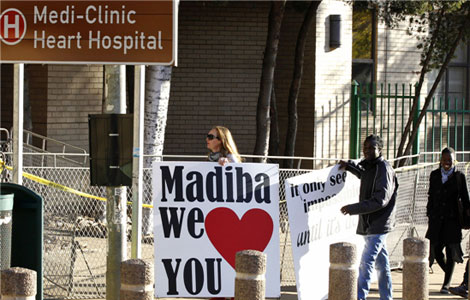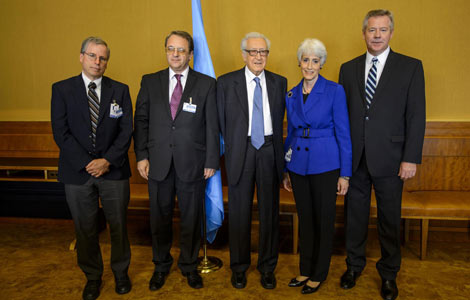Fed's QE3 decision causes stir
Updated: 2013-06-26 02:17
By Zhang Yuwei in New York (China Daily)
|
||||||||
Signal sends shockwaves through markets across Asia and Europe
The Federal Reserve's recent signal that it would withdraw stimulus efforts — otherwise known as quantitative easing round 3 — has rattled markets in Asia and Europe, and has drawn attention from leaders in emerging economies to forge a possible "safety net" to weather the uncertainty in global financial markets.
Spokesman for the Brazilian government Thomas Traumann said on Monday that the BRICS — Brazil, Russia, India, China and South Africa — will decide on coordinated action related to the global appreciation of the US dollar at a July meeting in Russia.
In a phone conversation with his Brazilian counterpart Dilma Rousseff on Monday, President Xi Jinping noted that some new and complex elements have occurred in international financial markets that deserved the BRICS nations' close attention.
Xi said the BRICS nations should boost communication and cooperation in financial sector and speed up the formation of a financial safety net.
Rousseff, who met Xi on the sidelines of the 5th BRICS summit in Durban in March, said Brazil is willing to maintain close communication and coordination with China and other BRICS countries in the financial field to safeguard the bloc's common interests.
QE3 end looms
Rousseff will contact other leaders of the BRICS group later this week to discuss concrete measures. Since Federal Reserve Chairman Ben Bernanke indicated that it may end the stimulus package after a policy meeting on June 19, global markets were shaken by the news.
Chinese shares extended losses on Tuesday following Monday's drastic slump as the benchmark Shanghai Composite Index lost 0.19 percent, or 3.73 points, to end at 1,959.51, the lowest point in nearly seven months.
Expectations that the US Federal Reserve will scale back its bond-buying program have dragged the Brazilian real to four-year lows, prompting the government to remove capital controls in a bid to bring more dollars into the economy. Brazilian stocks have also plummeted to more than four-year lows.
Emerging market economies at the G20 have called for the US to be clearer in its policy communication with markets to avoid more volatility, a Brazilian official said.
"But this time around we have more reserves and tools to tackle the problem," the official, who asked for anonymity, told Reuters.
During the 2008-09 global financial crisis, central banks from several major economies agreed to carry out currency swap agreements among themselves to bolster liquidity.
In March, Brazil and China agreed to set up a currency swap line that allowed them to trade the equivalent of up to $30 billion per year in their own currencies. The swap is meant to help businesses in both countries weather currency volatility.
Also in March, the BRICS group agreed to set up a $100 billion contingency fund among themselves, a move seen as a major step in advancing collective power of the BRICS nations. The self-governing fund — with the largest single share of $41 billion coming from China — would consist of currency reserves held by the five nations' central banks.
The fund's main purpose is to shore up the finances of a BRICS member if it falls into crisis and could also "contribute to strengthening the global financial safety net", South African President Jacob Zuma said in March.

 S African worries about Mandela's condition
S African worries about Mandela's condition
 Looted relics to return home this week
Looted relics to return home this week
 Astronauts go out of Shenzhou X's return capsule
Astronauts go out of Shenzhou X's return capsule
 Djokovic, Williams, and China's Li win openers
Djokovic, Williams, and China's Li win openers
 Russia, US disagree plan for Syria talks
Russia, US disagree plan for Syria talks
 Cooling off, the traditional way
Cooling off, the traditional way
 Surviving climber safe at home
Surviving climber safe at home
 Warning on college majors
Warning on college majors
Most Viewed
Editor's Picks

|

|

|

|

|

|
Today's Top News
4 Chinese killed in Papua New Guinea
US-China agree to boost corporate transparency
Global rating firm to rival 'Big Three'
New canal a lifeline for energy
China, EU hold human rights dialogue
Shenzhou X spacecraft mission a success
Riots in Xinjiang kill 27
Americans struggle over smartphones on vacation
US Weekly

|

|







